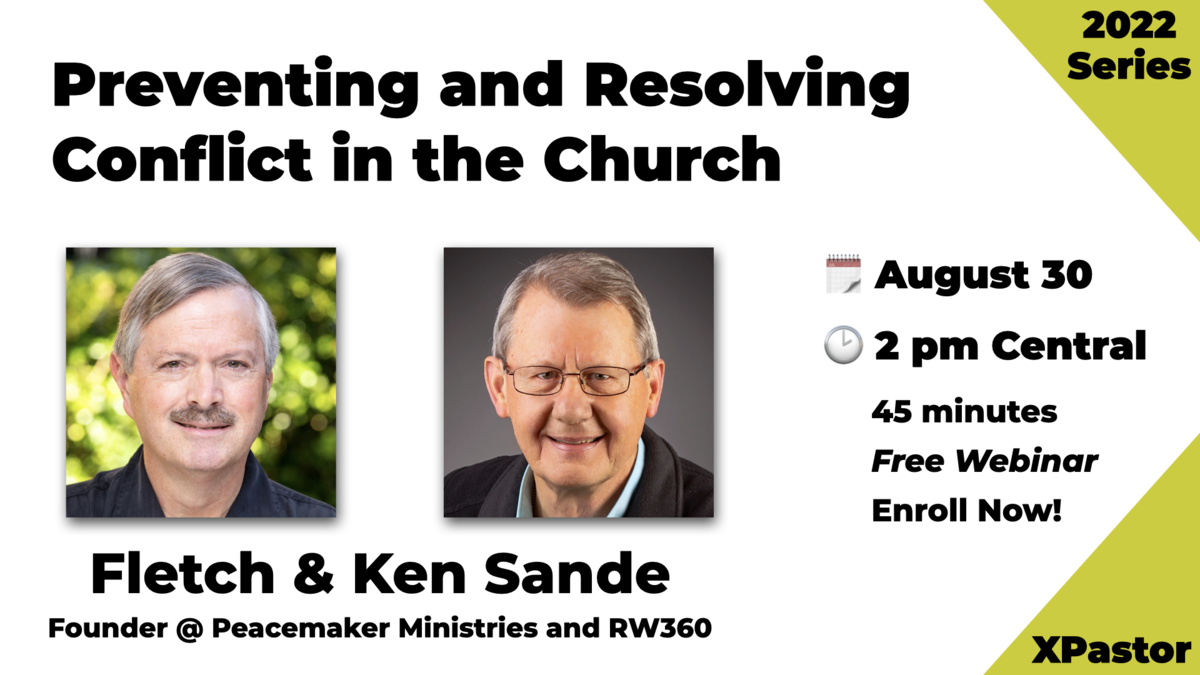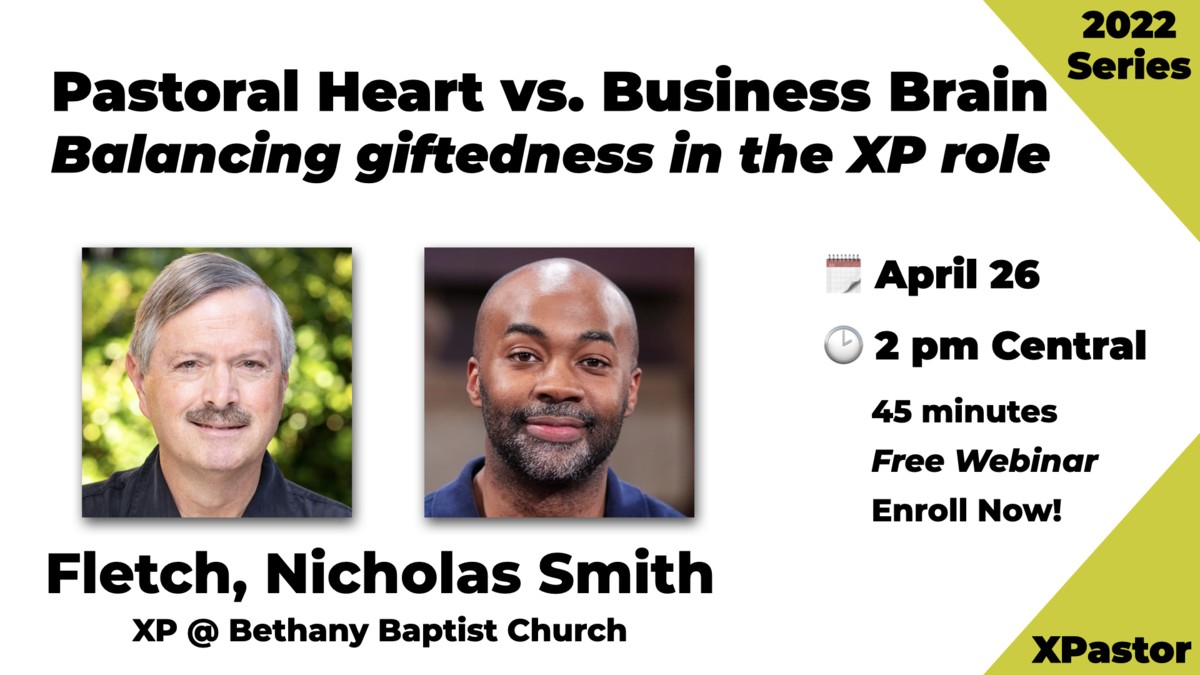“Five times I received from the Jews the forty lashes minus one. Three times I was beaten with rods, once I was stoned, three times I was shipwrecked, I spent a night and a day in the open sea, I have been constantly on the move. I have been in danger from rivers, in danger from bandits, in danger from my own countrymen, in danger from Gentiles; in danger in the city, in danger in the country, in danger at sea; and in danger from false brothers. I have labored and toiled and have often gone without sleep; I have known hunger and thirst and have often gone without food; I have been cold and naked. Besides everything else, I face daily pressure of my concern for all the churches.” 2 Corinthians 11:24-28 (NKJV)
Okay, so none of us is exactly the Apostle Paul. But you’ve got to admit that there are times when, as an XP, you feel like him. Many of us feel like we’ve been beaten and stoned by our enemies, have had our ideas and plans shipwrecked on the rocks of committee deliberation, felt anxiety from our own members and from those in other churches, as well as those we counted as brothers and sisters in the Lord. We’ve worked many long, arduous, difficult hours toiling for those whom we serve—many times missing meals with our families—and always under the pressure of concern for the well-being of our congregations. No one in this arena doubts your heart, drive, and love for God’s people. However, these three are not sufficient to keep you from danger in your calling. As XPs, you constantly face danger on many sides.
First there are the dangers from forces outside of your control. Committees can sometimes have a mind of their own. This is both a blessing and a curse. We want the help from a functioning team but we don’t want them going off in their own direction. “I mean isn’t this why God called me here in the first place, to lead these people?” Committees are many times limited in their scope; however, boards and elders can be quite different. There is a higher level of involvement from these individuals, usually also accompanied by a sense of empowerment. They are the voice of the congregation; people come to them, they hear things … we’ve all had those conversations before.
These next two dangers are related: The Old Guard and Tradition. The Old Guard represents those long-time members, sometimes founders, who feel as if this is their church and, therefore, they have some special dispensation to determine priorities, purpose, and direction. Tradition closely follows this danger. You may not have heard these exact words—“We’ve never done it that way before”—but you have probably, at the least, experienced some variation of it. Tradition can undermine innovation and stifle the presence of the Holy Spirit in a congregation or committee. It can also frustrate you and cause you to lose your job if you disagree with the wrong one, in the wrong way, at the wrong time. Or any combination of the above!
Like the Old Guard and Tradition, Fear and Change are related. Unfortunately, they compliment each other and not necessarily to anyone’s advantage. Fear is that dread of the unknown; it can lead to panic, debilitating apprehension, and, in severe doses, mental paralysis. The danger of Change is related to Fear in that it’s a leading cause of Fear in churches across the globe. People are afraid of Change; we are creatures of habit. Don’t believe it? Try this on: for the next four Sundays move the service around completely and see what happens. Well, after you finish sending out your updated resume, we can talk!
Finally, we have the last two external dangers on our short list, the Staff and the Senior Pastor. Both of these can be dangerous for some of the same reasons. Pride, personalities, program territory, pet projects … you name it. Those we mentor and lead can potentially be harmful to our vocational health. In the same way, a Senior Pastor-XP relationship can be potentially dangerous. He can be your best friend or, if you get sideways, he can be your greatest adversary.
Not all dangers to the XP are external, though. Some are inherent in who we are as human beings.
Pride is a huge one. 1 John 2:16 says, “For all that is in the world—the lust of the flesh, the lust of the eyes, and the pride of life, is not of the Father but is of the world.” (NKJV, emphasis mine) The “pride of life” here carries the idea of arrogance over life’s circumstances, it implies someone who thinks they’ve got the tiger by the tail, so to speak. Proverbs 16:18 also warns us that “Pride goes before destruction and a haughty spirit before a fall.”
Skill, Giftedness, and Natural Ability are three sides of the same coin. Each has to do with our aptitude or capacity to do or perform something or some task. Skill is something that is acquired or learned. Giftedness has to do with Spiritual Gifts as received from the Holy Spirit and Natural Abilities are those things that we have an aptitude for without any special training; we were born with an inclination to be able to do these things. All of these can get in the way and are potentially a danger to any XP when he or she relies on them, to the detriment of relying on God.
Our intelligence or learning has the capacity to lead us into danger as XPs by causing us to think that we can handle whatever comes our way. We’re just too smart for our own good! I had a pastor once tell me that he would retire when he could no longer outthink the deacons! Now this pastor loves the Lord and he was only joking with me, but I believe that it helps us to understand the point.
Indecision can be especially dangerous for any XP. The Staff or congregation may view one as weak or unable to lead when one has the disease of paralysis of analysis and cannot make a decision.
Finally another potential danger to any Executive Pastor is his or her own success. We can get caught up in the celebration of recent, or even not-so-recent successes and miss opportunities and/or challenges before us.
As great as these dangers are, they do not represent the greatest threat to all XPs. That title is reserved for the danger revealed in Galatians 2:20 “I have been crucified with Christ; it is no longer I who live, but Christ lives in me; and the life which I now live in the flesh I live by faith in the Son of God, who loved me and gave Himself for me.” (NKJV)
The single greatest danger to any Executive Pastor is in not realizing the truth of, and reckoning in the knowledge of, and resting in the reality of the exchanged life. This means that the old life we lived prior to coming to know Jesus as Savior and Lord has been crucified with Him and He now lives in us! “Fundamental” you say. “We all know this.” Intellectually we accept this premise as true and as elementary to our faith as anything. So what’s the deal? Why the danger?
Simply put, as Executive Pastors we are prone to performance-based evaluations. We can be as bad as any Senior Pastor when we attend a conference. What are the three things most of us want to know when we first meet someone else in ministry? Why the ABC’s of course! What’s your Attendance, How many Buildings do you have, and tell me about your Cash (budget). We’re not all that different from the disciples after Jesus finished speaking with the rich, young ruler in Mark 10. Jesus had just told them that it was “… easier for a camel to go through the eye of a needle than for a rich man to enter the kingdom of God.” The Bible then records that the disciples were greatly astonished because they believed that the more wealth a person possessed, the more alms he could give away and therefore purchase his way into heaven. If a rich man couldn’t get into heaven, then who could? Many times we fall into the old paradigm of bigger must mean more blessed. The nature of what we do calls for evaluation. Evaluation in and of itself is not bad. It’s what we try to evaluate with respect to how we measure ourselves and our effectiveness in ministry that is dangerous. Typically we measure things according to the flesh, things that we are able to accomplish in our own strength. In other words, things we can do under our own power—potentially self-sufficient things.
I’ve heard it said that most Christians seem to have a spiritual inferiority complex. That is, they know that they are saved and forgiven but have an underlying feeling, as if they have a responsibility to live a certain way. They may not consciously think that they need to earn God’s favor or do certain things to gain His pleasure, but they certainly act like it. I suffered from one for years and still struggle in this area. There is even the danger of becoming so busy trying to do something for God that one loses intimacy with God. Self-sufficient service can be defined as anything that we try to accomplish for God that relies on our own strength, abilities, intelligence, knowledge, skills, giftedness, etc., rather than relying on and resting in God’s resources. In Galatians 5:16-25, Paul tells us that “the works of the flesh are evident” and then he goes on to list several areas of this evidence. The list he provides is by no means exhaustive but it is representative. Then, in verse 22, he begins to list the fruits of the Spirit and proceeds to tell us that against these things there is no law. In verse 24 he explains that those who are “Christ’s have crucified the flesh …” 2 Corinthians 5:17 tells us “Therefore, if anyone is in Christ, he is a new creation; old things have passed away; behold, all things have become new.” It says: old things have passed away. That means that they died! What old things? Your old nature, your flesh, not your physical body but your old value system, your sinful nature has been crucified with Christ. You are now free from the task of having to earn God’s delight in you. He already loves you as much as He possibly can. Nothing you can do for Him will change that fact. “But God demonstrates His own love toward us, in that while we were still sinners, Christ died for us” Romans 5:8. God loved you enough to die for you while you were still separated from Him by sin. But you say, “I just want to do something for God.” Sounds good, but it’s bad.
On a recent day I was watching some men replace the roof on the house behind us. It was a two story house and the section that they were working on at the time was steeply pitched. The workers had a rope that they held onto with one hand and in the other they held the tool they were working with. It seemed a rather awkward, inefficient and potentially dangerous way to work. It occurred to me that most Christians do this in their spiritual lives as well. With one hand they hold on to the grace of salvation and with the other they grasp the law of their own strength. They become bogged down in their feelings of inadequacy. The reality is that they can’t do either very well when their strength, attention and concentration are so divided. Wouldn’t it be better to let the rope hold them? The good news is that that is exactly what our God does for us. We can rest in knowing that He has permanently tied Himself to us through Jesus.
Take a look at these examples of what happens when we fail to appropriate this: Moses, convinced he is to lead the Israelites from bondage, murders an Egyptian guard; Aaron collects gold and casts an idol while Moses is up on the mountain; Abraham and Sarah have a child with their handmaiden rather than waiting on God’s provision. In the New Testament, while Scripture does not explicitly say this, I believe that Judas thought he was forcing Jesus’ hand into becoming the earthly king he sought when he betrayed our Lord. There are many more examples of people trying to do for God that did not turn out as they hoped. God did not ask you to do something for Him. However, He did ask for you!
John 15:1-8 is the familiar story of the vine and the branches. In verse 1, Jesus says: “I am the true vine, and my Father is the vinedresser.” Take note that only God and Jesus are mentioned. We aren’t even in the picture yet. Jesus is the vine itself and His Father is the caretaker or vinedresser. In verse 5, He again states, “I am the vine,” then He also adds, “you are the branches. He who abides in Me, and I in him, bears much fruit; for without Me you can do nothing.” Continuing on to verse 6, “If anyone does not abide in me, he is cast out as a branch and is withered …” Get all that? We are merely branches on the great cosmic vine of eternal life!
I worked at a commercial nursery for a time. We grew interiorscape plants—plants intended and acclimated to be utilized indoors. One thing I learned while there was that if you separated a branch from the host plant, it died. It works the same for you and me. We are intended to be attached to the true vine, Jesus. We have already learned that He is alive in us. Now we see that we are truly only fruitful when we abide in Him and He in us. God’s Word tells us that without being attached to the vine we can do nothing!
It might be good then to ascertain what it means to abide in Him. To abide in something means to remain or rest in. Abiding carries the idea of staying near. In Exodus 33, the LORD is angry with the Israelites. He decides to send an angel to lead them because He is concerned that He might consume them on the way because “you are a stiff-necked people.” Moses then said to the LORD “Let me know Your ways that I may know You, so that I may find favor in Your sight …” Moses knew that without God going before them they were not going to be a people set apart. Likewise, without being attached to the true vine—Jesus—we are as a branch withered to be cast out and consumed as firewood.
God is infinitely more concerned with our becoming than with our doing. “For whom He foreknew, He also predestined to be conformed to the image of His Son …” Romans 8:29 (NKJV). “And do not be conformed to this world, but be transformed by the renewing of your mind, that you may prove what is that good and acceptable and perfect will of God.” Romans 12:2 (NKJV). Sometimes we get to the place where God has no choice but to completely bring us to a breaking point in our personal, professional or spiritual lives. His goal in this breaking in not to punish us, rather to bring us to the point where we no longer depend upon our own self-sufficiency or flesh, and instead only have Him. Only then, when we and our resources are out of the way, can we experience genuine intimacy with God.
Can a person who is saved go through the Christian life without understanding this, without appropriating the life of Christ in them? Unfortunately yes. As mentioned earlier, many, if not most Christians, go through life defeated because of constantly trying to earn God’s favor and feeling as if they do not measure up. I lived a defeated Christian life for years, trying to earn my place in God’s kingdom. However, any effort to do something for God that comes from our own strength is flesh. Unfortunately, Senior Pastors, staff members, congregants and even XPs do it every day. God simply wants us. Acknowledge by faith the rest of God, “For we who have believed do enter that rest …” Hebrews 4:3a, and let Him live His life through you. Find the peace and assurance we all seek, not through our own efforts and successes, but through a rest that comes from abiding in Christ and manifesting His life through us.











